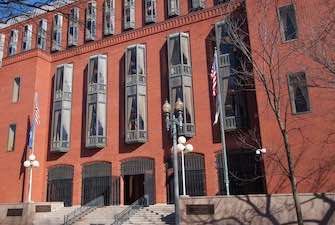Each week, we succinctly summarize the preceding week of Federal Circuit precedential patent opinions. We provide the pertinent facts, issues, and holdings. Our Review allows you to keep abreast of the Federal Circuit’s activities – important for everyone concerned with intellectual property. We welcome any feedback you may provide.
– Joe Robinson, Bob Schaffer, Parker Hancock, and Puja Dave
83-3. Restricted Sales Do Not Exhaust Patent Rights Under Supreme Court Rulings
Lexmark Int’l Inc. v. Impression Prods., No. 2014-1617, 2014-1619, 2016 U.S. App. LEXIS 2452 (Fed. Cir. Feb. 12, 2016) (Before Newman, Lourie, Dyk, Moore, O’Malley, Reyna, Wallach, Taranto, Chen, Hughes, Stoll, and Prost, CJ.) (Opinion for the court, Taranto, J.). Click Here for a copy of the opinion.
 Lexmark sued Impression Products for infringing a patent related to printer cartridges. Impression takes used Lexmark printer cartridges, refills them, and resells them. Lexmark sells printer cartridges in two ways. Some cartridges are sold without any restriction on refilling or reusing them. Some cartridges are sold as part of a return program, subject to a single-use/no-resale restriction that is clearly marked on the outside of the box. These cartridges cannot be resold or reused after use, but can only be returned to Lexmark. The cartridges sold in the return program are sold at a discount. Further, the cartridges sold in the return program contain a digital rights management (DRM) microchip that does not allow the cartridges to be used multiple times.
Lexmark sued Impression Products for infringing a patent related to printer cartridges. Impression takes used Lexmark printer cartridges, refills them, and resells them. Lexmark sells printer cartridges in two ways. Some cartridges are sold without any restriction on refilling or reusing them. Some cartridges are sold as part of a return program, subject to a single-use/no-resale restriction that is clearly marked on the outside of the box. These cartridges cannot be resold or reused after use, but can only be returned to Lexmark. The cartridges sold in the return program are sold at a discount. Further, the cartridges sold in the return program contain a digital rights management (DRM) microchip that does not allow the cartridges to be used multiple times.
Impression Products purchases used return program cartridges in the US and internationally, and remanufactures them. Further Impression Products is able to override the DRM microchip to permit the return program cartridges to be re-used. Lexmark sued Impression for patent infringement based on Impression’s remanufacture of return program cartridges sold in the US, and for remanufacture of regular and return program cartridges sold internationally. Impression asserted a single defense to infringement – that Lexmark’s sale of the return program cartridges both in the US and internationally exhausted Lexmark’s rights with respect to those cartridges.
The district court granted Impression’s motion to dismiss based on the return program cartridges in the US. It held that the conditional sales still exhausted Lexmark’s rights in the return program cartridges. Although the Federal Circuit previously held that conditional sales did not exhaust patent rights in Mallinckrodt v. Medipart, the district court reasoned that the Supreme Court’s opinion in Quanta Computer, Inc. v. LG Electronics had overruled Mallinckrodt.
The district court denied Impression’s motion to dismiss based on the sale of return program and non-return program cartridges sold internationally. Impression argued that the Supreme Court’s copyright exhaustion doctrine in Kirtsaeng v. John Wiley & Sons, Inc. was applicable to patents, and thus the sale of a patented product internationally exhausts the patentee’s rights in the US. The district court held that Kirtsaeng was rooted in the statutory text of the copyright act (§ 109(a)) , and it did not affect the common-law patent exhaustion doctrine. Instead, international sales do not exhaust patent rights in the US, citing the Federal Circuit’s opinion in Jazz Photo v. U.S. Int’l Trade Comm’n.
The Federal Circuit took the case en banc to review the applicability of the patent exhaustion doctrine under Mallinckrodt and Jazz Photo, in view of the Supreme Court’s decisions in Quanta and Kirtsaeng. The Federal Circuit affirmed the holdings in Mallinckrodt and Jazz Photo, and distinguished them from the Supreme Court’s decisions. In Quanta, the Supreme Court was reviewing whether a patentee’s rights in a product were exhausted by a licensee’s sale of a product. Here, there was a restriction on the types of sales a licensee could make, but there were no restrictions on the goods sold to end users, and patent exhaustion still applied. Quanta thus did not overrule Mallinckrodt.
Second, Jazz Photo still applies because Kirtsaeng was rooted in the copyright statute, which expressly grants a right to resale to purchasers of copyrighted works. There is no statutory corollary in the patent laws. Thus, the federal circuit’s rule in Jazz Photo, that a sale abroad does not exhaust patent rights in the US, still applies.
The Federal Circuit thus affirmed the decision of the district court with respect to sales internationally, and reversed with respect to sales in the US.
Judge Dyk and Judge Hughes dissented. Contrary to the majority, Quanta reaffirmed a long line of Supreme Court cases, holding that the authorized sale of a patented product – with or without restriction – terminated the patentee’s rights with respect to the product. Specifically, any conditions or restrictions create a contractual relationship, but the patent rights are exhausted. “In other words, a sale with restrictions could nonetheless be an ‘unconditional’ sale in which title passes, with the restrictions invalid under the patent laws because of exhaustion.” Further, the dissent argued that Kirtsaeng should be read to overrule Jazz Photo. In Kirtsaeng, the Supreme Court recognized that the first sale doctrine is a common law doctrine grounded in the common law’s presumption against restrictions on the free exchange of goods. Thus, the same rule should be applied to patent law, which draws from the same common-law background as the copyright statute.

![[IPWatchdog Logo]](https://ipwatchdog.com/wp-content/themes/IPWatchdog%20-%202023/assets/images/temp/logo-small@2x.png)



![[Advertisement]](https://ipwatchdog.com/wp-content/uploads/2024/04/Patent-Litigation-Masters-2024-sidebar-early-bird-ends-Apr-21-last-chance-700x500-1.jpg)

![[Advertisement]](https://ipwatchdog.com/wp-content/uploads/2021/12/WEBINAR-336-x-280-px.png)
![[Advertisement]](https://ipwatchdog.com/wp-content/uploads/2021/12/2021-Patent-Practice-on-Demand-recorded-Feb-2021-336-x-280.jpg)
![[Advertisement]](https://ipwatchdog.com/wp-content/uploads/2021/12/Ad-4-The-Invent-Patent-System™.png)







Join the Discussion
No comments yet.